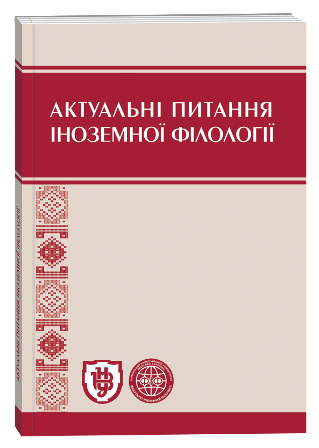SOCIOLINGUISTIC PECULIARITIES OF FRAMES OF RUSSIAN-UKRAINIAN WAR OF 2022
DOI:
https://doi.org/10.32782/2410-0927-2022-16-30Keywords:
language of war, language frame, framing theory, media, media coverage, sociolinguistic, semanticAbstract
The current war, unleashed by Russia against Ukraine, that actually began in 2014, has been constantly producing more and more linguistic units subordinated to certain frames. The aim of this research is to identify new frames that have appeared in the coverage of the war events since February 24, 2022; to analyze the reasons that caused those morphemes/ words/phrases to become sociolinguistic frames, to describe their linguistic features that contribute to growth of their manipulative potential and impact on the audience. The ideas of Gregory Bateson, V. von Humboldt, J. Green, D. Hymes, M. Saville-Troike, Entman, A. Wierzbicka, S. Russell, O. Rohach served the ground for the research. Methods of observation, comparative analysis, synthesis have been employed. The choice of new frames in the language of war was made considering popular ways for framing news stories that were outlined by R. M. Entman (Entman, 1991) and critera for choosing the key words worked out by A. Wierzbicka (Wierzbicka, 1997). It was found out that the identified frames of war reflect human interest or consequences, are based on emotions, and bear morale. Language of war frames depends on the level of culture in society. From the lexical point of view these frames depict a close link between society and a language’s lexicon and can be borrowed from foreign languages. The scale of the military conflict defines the semantic variety and degree of tension of metaphors. From the structural point of view frames are shortenings of various types, affixation, abbreviations and blending. Breaking orthography rules contributes to emotional coloring of the language of war. The spelling of the English word “ruscism” was justified, clarifying its semantic difference from the words “russism” and “racism”. Analyzing the popular frames from the sociolinguistic angle would help find out the mechanisms of their emergence and help foreign media understand their meaning correctly. Consequently, it might provide the true coverage of the events in Ukraine. by foreign media.
References
Bateson G. Steps to an ecology of mind: Collected essays in anthropology, psychology, evolution and epistemology. San Francisco, CA : Chandler, 1972. 533 p.
Dictionary by Merriam-Webster: America’s most-trusted online dictionary. URL: https://www.merriam-webster.com (дата звернення: 03.05.2022).
Fact check: Ukrainian stamp honoring Snake Island soldiers’ response to Russian warship is real. USA Today. URL: https://en.wikipedia.org?wiki/USA_Today (дата звернення: 03.05.2022).
Entman R. M. Framing US Coverage of international News: Contrast in Narratives of KAL and Iran Air Incidents. Journal of Communication. 1991. Vol. 41 № 4. P. 6–27. URL: https://www.researchgate.net/publication/229461133_Framing_US_Coverage_of_International_News_Contrast_in_Narratives_of_the_KAL_and_Iran_Air_Incidents (дата звернення: 03.05.2022).
Goffman E. Frame Analysis: An Essay on the Organization of Experience. New York, NY : Harper & Row. 1974. 586 p.
Hallahan K. Strategic Framing. International Encyclopedia of Communication, Blackwell. 2008. URL: https://sites.pitt.edu/~mitnick/BPweb/HallahanStrategicFramingHallahan_ICE_051507.pdf (дата звернення: 01.05.2022).
Гринів O. Рашизм із прицілом на україноцид. URL: https://www.qwas.ru/ukraine/nru/Profesor-Oleg-Grin-v-RAShIZM-Z-PRIC-LOM-NA-UKRA-NOCID/ (дата звернення: 03.05.2022).
Кізілов Є. Зеленський: Слово «рашизм» увійде в підручники з історії в усьому світі. «Українська правда». 23 квітня 2022. URL: https://www.pravda.com.ua/news/2022/04/23/7341654 (дата звернення: 03.05.2022).
Кулеба закликав світ кріміналізувати використання символу рашистів “Z”. Informatsiyne agentstvo Ukrainski Natsionalni Novyny (УНН). – цитовано: March 30, 2022. URL: https://www.unn.com.ua/uk/news/1970124-kuleba-zaklikav-svit-kriminalizuvati-vikorystannya-simvolu-rashistiv-z (дата звернення: 02.05.2022). [in Ukrainian]
Luntz F. Political Strategy. Republican Playbook. 2005. URL: https://www.dailykos.com/stories/2005/3/2/96330/(дата звернення: 03.05.2022).
Mass Communication Theory. Framing Theory. 2017, January 31. URL: https://masscommtheory.com/theoryoverviews/framing-theory/
Online Etymology Dictionary. URL: https://www.etymonline.com (дата звернення: 03.05.2022).
Remember the alamo! Definition & Meaning | Dictionary.com). URL: https://www.dictionary.com (дата звернення: 03.05.2022).
Рогач O. The Language of War. Науковий Журнал № 2, с. 161–166. URL: akpif_2015_2_30.pdf
Russel S. Language of War. URL: https://soa.illinoisstate.edu/downloads/anthro_theses/russel_sara.pdf (дата звернення: 01.05.2022).
Satter D. Opinion: Russia’s euphoria over Crimea won’t last. CNN. 2014, April. URL: https://edition.cnn.com/2014/03/31/opinion/russia-euphoria-crimea/index/html (дата звернення: 03.05.2022).
В Росії використовують Z-символіку для пропаганди війни та залякування опозиції. Ukrrain. Ukrainskyi doshch. 19.03.2022. URL: https://ukrrain.com//v_rosii_vikoristovuyut_zsimvoliku_dlya_propagandy_vijni_na_zalyakuvannya (дата звернення: 02.05.2022).
Weaver D. Thought on Agenda Setting, Framing and Priming. Journal of Communication. 2007. P. 142–147.
Weber P. How “Russian warship, go f-k yourself” became Ukraine’s “Remember the Alamo!”. URL: The Week (дата звернення: 02.05.2022).
Wierzbicka A. Understanding Cultures Through Their Key Words: English, Russian, Polish, German, and Japanese. Oxford : Oxford University Press, 1997. 317 p.
Забужко О. З уроків великого блефу: чому 40 мільйонів українців кинули на поталу «серійному вбивці». URL: https://radiosvoboda.org/a/zakhid-putin-khb-viyna-ukrayina/31820455.html (дата звернення: 03.05.2022).
Ziezulewicz G. Ukrainians trapped on Snake Island to the Russians demanding their surrender: “go f*ck yourself”. URL: Navy Times. Archived from the original on 25 February 2022 (дата звернення: 05.03.2022).







